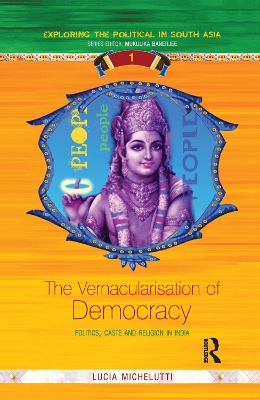Exploring the Political in South Asia
1 total work
The book is an ethnographic exploration of how ‘democracy’ takes social and cultural roots in India and in the process shapes the nature of popular politics. It centres on a historically marginalised caste who in recent years has become one of the most assertive and politically powerful communities in North India: the Yadavs.
The Vernacularisation of Democracy is a vivid account of how Indian popular democracy works on the ground. Challenging conventional theories of democratisation the book shows how the political upsurge of 'the lower orders' is situated within a wider process of the vernacularisation of democratic politics, referring to the ways in which values and practices of democracy become embedded in particular cultural and social practices, and in the process become entrenched in the consciousness of ordinary people. During the 1990s, Indian democracy witnessed an upsurge in the political participation of lower castes/communities and the emergence of political leaders from humble social backgrounds who present themselves as promoters of social justice for underprivileged communities. Drawing on a large body of archival and ethnographic material the author shows how the analysis of local idioms of caste, kinship, kingship, popular religion, ‘the past’ and politics (‘the vernacular’) inform popular perceptions of the political world and of how the democratic process shapes in turn ‘the vernacular’. This line of enquiry provides a novel framework to understand the unique experience of Indian democracy as well as democratic politics and its meaning in other contemporary post-colonial states.
Using as a case study the political ethnography of a powerful northern Indian caste (the Yadavs) and combining ethnographic material with colonial and post-colonial history the book examines the unique experience of Indian popular democracy and provides a framework to analyse popular politics in other parts of the world. The book fills existing gaps in scholarly analysis of political processes by contributing to the understanding of how democracy has been internalised in the popular consciousness of different societies through various abstract principles of political representation, especially by exploring ‘democracy’ in areas which are not thought of as political per se (for example, family, kinship, kingship, popular religion, and local ideas of personhood).
